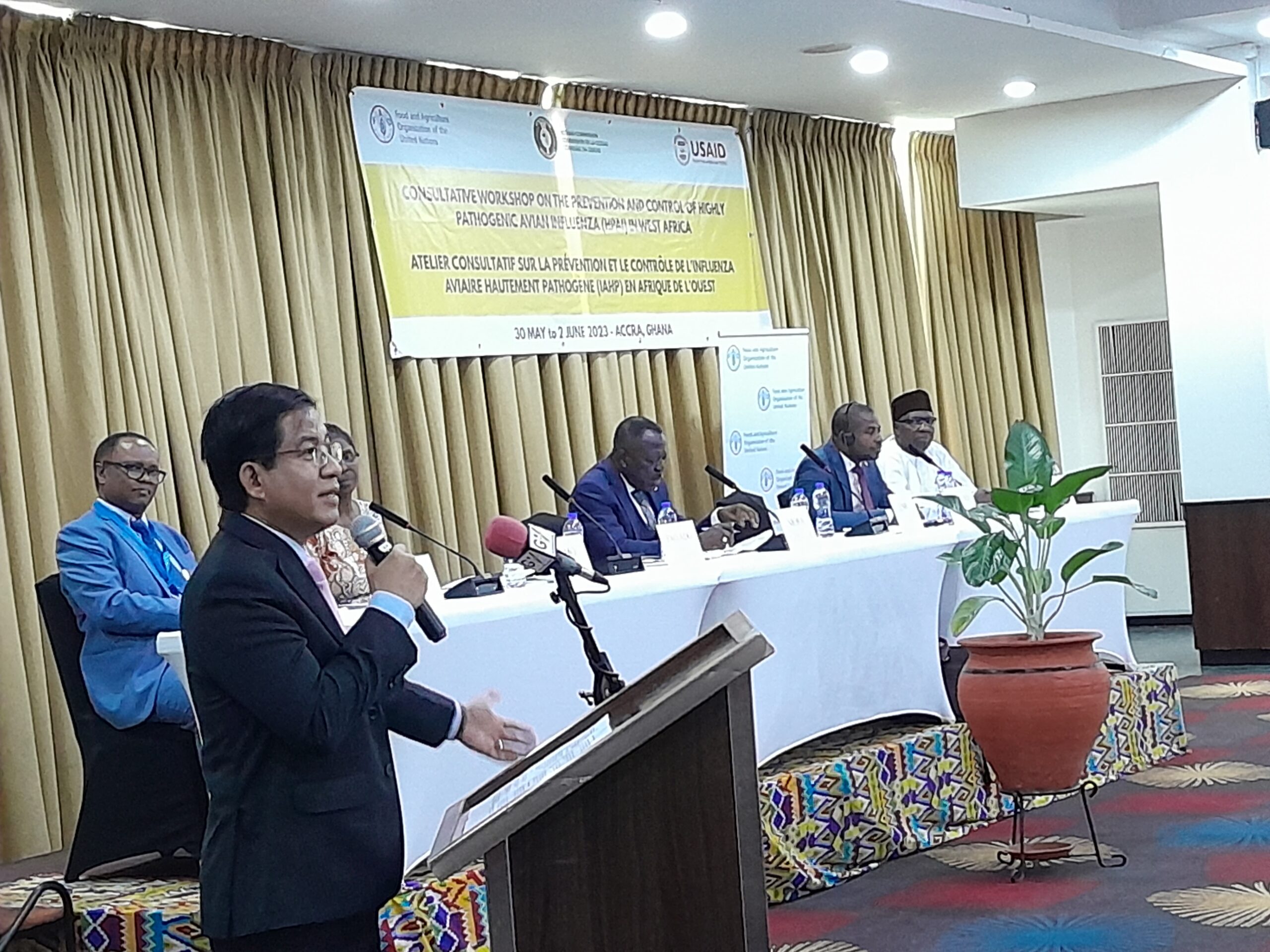
Accra, Ghana//-The Food and Agriculture Organisation (FAO) of the United Nations (UN) has held a four-day Consultative Workshop on the Prevention and Control of Highly Pathogenic Avian Influenza (HPAI) in West Africa (WA).
The main objective of the workshop attended by veterinary officers, researchers, businesspeople, policy-makers, among others was to contribute to minimise the risk of HPAI occurrence and its spread within and between countries of the ECOWAS region.
Speaking at the opening at the opening ceremony, FAO Ghana Representative, Yurdi Yasmi, said: “Today’s meeting is a post-COVID-19 meeting, which has brought you all physically together to discuss on this devastating disease and help farmers in Africa with simple but robust techniques for the prevention and control of the disease”.
He hopes the work would give a clear recommendation on the various sanitary measures to be used and adopted for the prevention and control of the disease.
Significant impact of the disease
Highly Pathogenic Avian Influenza has caused recurring outbreaks especially in the West Africa countries since it was first detected in 2006.
The disease, according to him, has had a significant impact on the livelihood of poultry farmers and on the food and nutrition security for people because chicken provides the greatest source of protein in the region.
“Therefore, this workshop is very timely as we need to address key strategic issues of the Highly Pathogenic Avian Influenza, which is not only the worst threat to the poultry of the West Africa, but it also poses public health risks because of its zoonotic potentials”, Mr Yasmi said.
This meeting follows the Global Consultative Meeting on Avian Influenza held from 2-4 May 2023 in Rome, Italy which was also organized by FAO.
The Accra workshop would take into consideration the recommendations from the Rome Meeting and did a rigorous review and stocktaking of regional policies, tools and capacities and formulate workable recommendations for the region.
Recent outbreaks
In the last few years, most West African countries have reported HPAI outbreaks. In 2021 alone eight countries experienced HPAI outbreaks in poultry leading to significant losses.
Currently, five West African Countries including Senegal and the Gambia are facing active HPAI outbreaks in both wild and domestic birds.
Commitments
“FAO is committed to supporting member countries in minimizing the impact of HPAI and other transboundary animal diseases, especially those with zoonotic potentials, on the livestock sector and reducing the public health threat”.
FAO also remains committed to supporting the implementation of the recommendations that arise from this meeting, Mr Yasmi who is also the Deputy FAO Africa Representative added.
FAO has consistently responded to the solicitations from the ECOWAS and joined its forces to support member states during avian influenza outbreaks.
FAO support
Some of the FAO’s support he mentioned include providing personal protective equipment, assisting with culling operations, and facilitating the shipment of HPAI samples for laboratory testing.
FAO has also supported member countries in enhancing their capacity for biosecurity, disease emergency management, and laboratory diagnostics for HPAI and other priority zoonotic diseases.
Many laboratories supported through the USAID Global Health Security Agenda Project now have the capability to diagnose HPAI. FAO, he noted, has placed special emphasis on supporting sectors and segments of society directly affected by HPAI.
For instance, in Ghana, FAO organized biosecurity training for women poultry farmers, women guinea fowl farmers, women egg sellers, and women live bird sellers in collaboration with the Veterinary Service Directorate and the School of Veterinary Medicine.
Regional consultative meetings
FAO in collaboration with the ECOWAS has organised several regional consultative meetings on Highly Pathogenic Avian Influenza since its first outbreak in the region. The recent one was in September 2021 conducted virtually and involving all ECOWAS member states.
He explained that FAO’s strategic framework for 2022-2031 identifies One Health as a priority program area at both the global and regional levels.
Appreciations
Mr Yasmi thanked the organizers of this workshop, especially FAO colleagues from the Emergency Centre for Transboundar Animal Diseases in the Western and Central Africa and the ECOWAS.
Plan for Avian and Pandemic Influenzas
In a speech read for Ghana’s Minister of Food and Agriculture, Bryan Acheamong, said: “As a result of the first outbreak in 2007, Ghana developed a preparedness and response plan for Avian and Pandemic Influenzas, this was revised in 2019”.
The common risk factors that are associated with the outbreaks of HPAI in Ghana are Wetlands, forest reserves and water bodies, according to him.
“Local Government authorities support in the prevention and control of HPAI by providing depopulation equipment whereas the Ghana Fire Service provides Fire Service Tenders for humane depopulation of affected birds during outbreaks”.
Also, as part of measures to control the HPAI, the Veterinary Service Directorate (VSD) of the Ministry of Food and Agriculture (MoFA) instituted actions to ensure reducing the contact rate amongst domestic birds, reducing the population of infected birds by Stamping Out and restricting the transportation of infected birds within the country.
Preventive and Control Measures
Ghana’s Preventive and Control Measures of the Avian Influenza with ECOWAS includes cross border meetings, meetings of ECOWAS chief veterinary Officers on HPAI, notification of AI outbreaks to neighbouring countries and restriction of movement of poultry and poultry products across borders during outbreaks.
Over the years, Ghana receives a lot of support from its development partners in the prevention and control of Avian Influenza.
The FAO supported the VSD of Ghana in the recent outbreak with the shipment of samples to Pandova for molecular diagnoses and sequencing, provision of Personal Protective Equipment (PPEs), reagents and consumables for Avian Influenza diagnosis.
The FAO also supported the provision of HPAI Antigen Rapid Tests kits for field diagnosis of the Avian Influenza and capacity building of veterinary staff.
The Canadian Food Inspection Services also supported the shipment of samples to Winnipeg for diagnosis and sequencing as well as the provision of reagents for local diagnostic purposes.
kkkk


